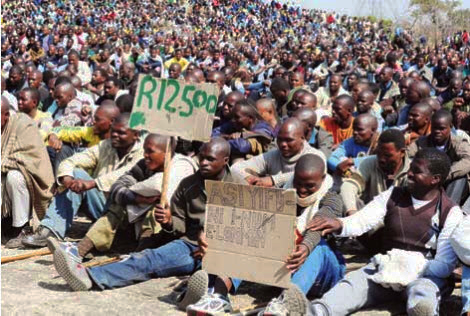SACP
South Africa: Chris Hani would be angry at ANC 'adopting our class opponents' policies'

By the National Union of Metalworkers of South Africa
African solidarity with the Venezuelan revolution and tributes to Hugo Chavez

Hugo Chavez's funeral, March 8, 2013.
[Below are statements issued by left and progressive organisations in Africa. More will be posted as they come to hand.]
* * *
Taking forward the revolutionary life and symbolism of hugo Rafael Chavez Frias
March 10, 2013 -- The Democratic Left Front (DLF) of South Africa joins the millions of poor and working people and their mass movements in Venezuela, the Caribbean, Latin America and across the world who celebrate the revolutionary and emancipatory life and symbolism of Hugo Rafael Chávez Frías. Since his tragic passing away on March 5, our hearts have drawn inspiration and courage from his example and symbolism.
As the 9 million people who attended his funeral on March 8 showed, Chavez represented and personified immense hope and possibility: hope for the wretched of the Earth, hope and faith in the ability of the mass of exploited and oppressed people to self-organise and challenge inordinate power relations in society, and thereby be their own liberators, and realistic hope in the possibility of constructing a socialist alternative to the barbarism of capitalism.
South Africa: Politics, profits and policing after the Marikana Massacre

Lover of fast cars, vintage wine, trout fishing and game farming and the second richest black businessperson in South Africa (global financi
South Africa: What has Hurricane Sandy taught the ruling elite?

Storm surge from the cyclone in Durban, March 2007.
By Patrick Bond
South Africa: Latest ANC/police attack on militant miners condemned

SACP's Blade Nzimande leads COSATU members prior to clashes with striking Anglo Platinum miners.
South Africa's political economy after the Marikana massacre

Marikana miners protest against the August 16, 2012, massacre by police.
South Africa: 'The SACP has become a vanguard of ANC power factionalism'

South Africa's ANC president Jacob Zuma (right) dances with SACP general secretary Blade
South Africa: Marikana massacre – a turning point?

Marikana mineworkers on strike for higher pay.
For more coverage of South Africa, click HERE.
By Martin Legassick
August 27, 2012 – Links International Journal of Socialist Renewal -- The massacre of 34, and almost certainly more, striking mineworkers at Marikana (together with more than 80 injured) on August 16 has sent waves of shock and anger across South Africa, rippling around the world. It could prove a decisive turning point in our country’s post-apartheid history.
Marikana is a town situated in barren veld, dry brown grass in the winter, with occasional rocky outcrops (kopjes, hillocks). The Lonmin-owned mines – there are three, Karee, West and East Platinum – are situated on the outskirts of the town. Alongside two of them is a settlement of zinc-walled shacks festooned with lines of washing called Enkanini, where most of the mineworkers live.
South Africa: 'Sorting fact from fiction at Marikana' -- Terry Bell on the massacre of mineworkers

For more coverage of South Africa, click HERE.
August 27, 2012 -- Terry Bell is a widely respected labour reporter and activist based in Cape Town, South Africa. His "Inside labour" columns in Amandla! magazine and on his blog, Terry Bell Writes, are essential reading for those interested in developments in South Africa's labour movement. Below, with Terry Bell's permission, Links International Journal of Socialist Renewal posts some of his recent columns dealing with Marikana massacre and the background to it.
* * *
By Terry Bell
August 23, 2012 -- Terry Bell Writes -- The deaths at Lonmin amount to the bloodiest tragedy of the post-apartheid era. As a result, the blame game is in full swing and is likely to continue in the weeks ahead.
South Africa: (updated Aug. 29) Justice now for the Marikana workers and community!

August 24, 2012 – In the aftermath of the t
South Africa: The massacre of our illusions … and the seeds of something new
By Leonard Gentle, director of the International Labour Research and Information Gro
